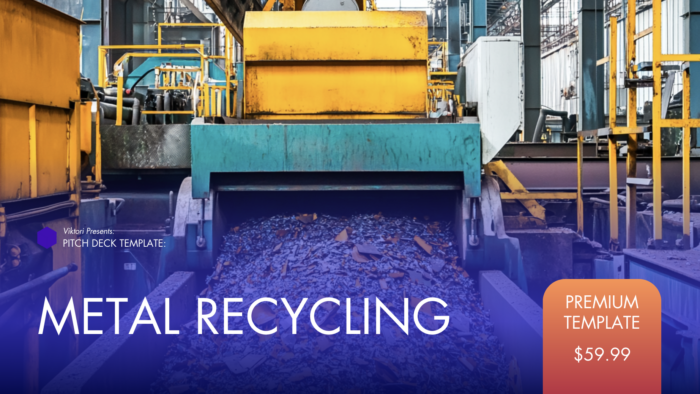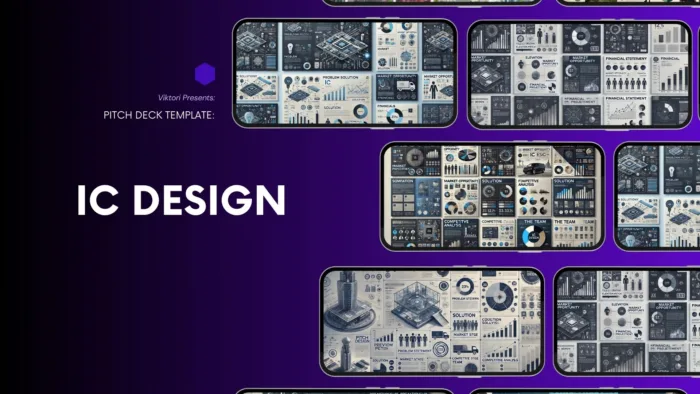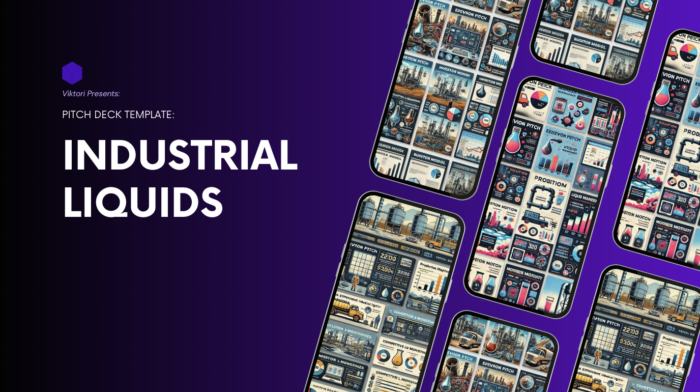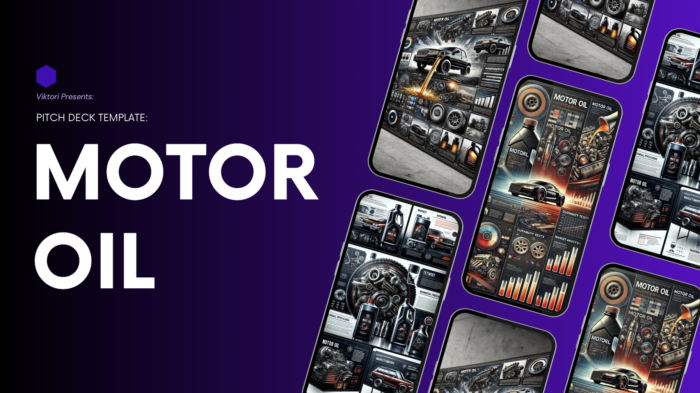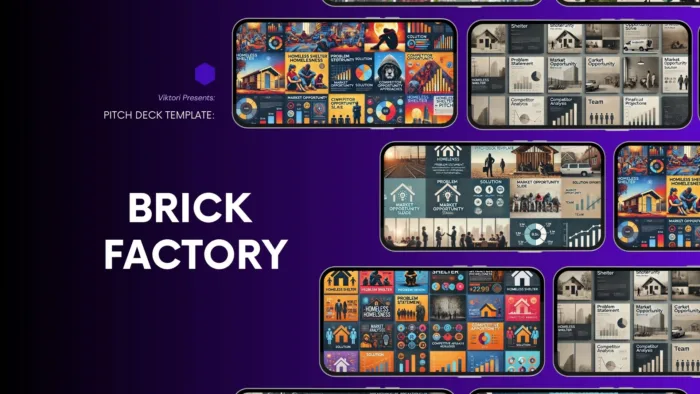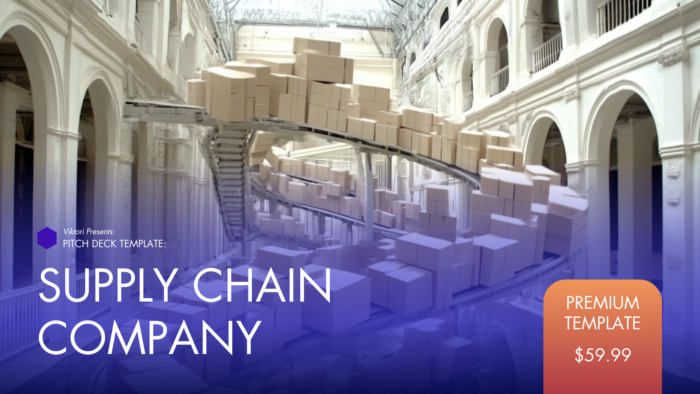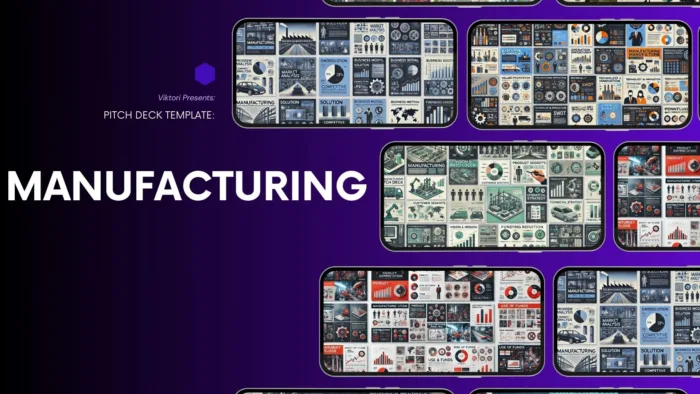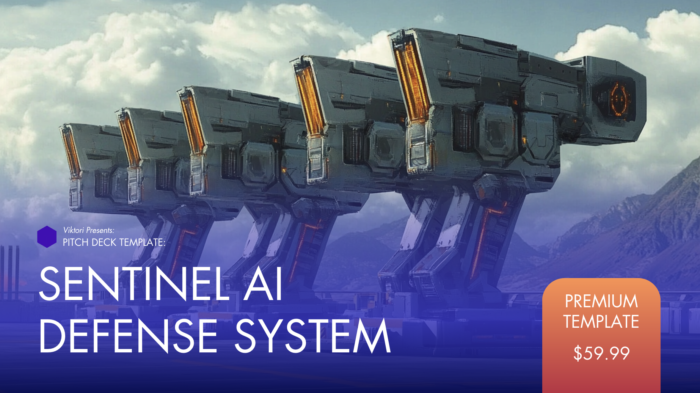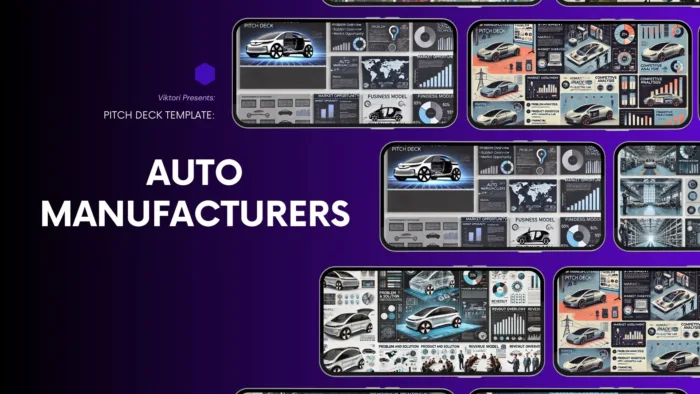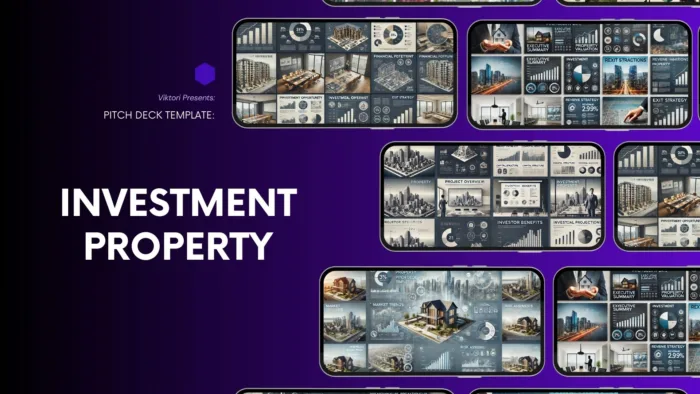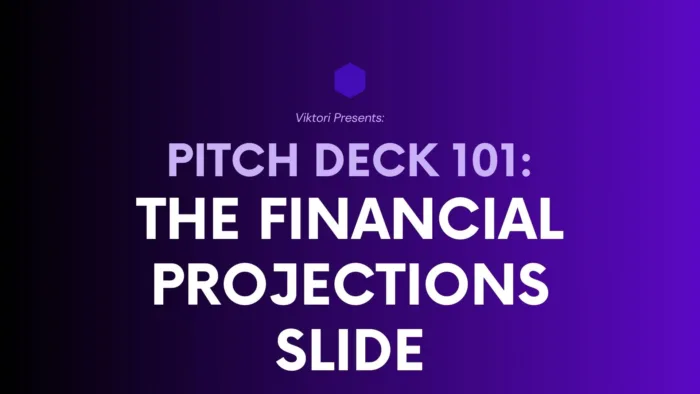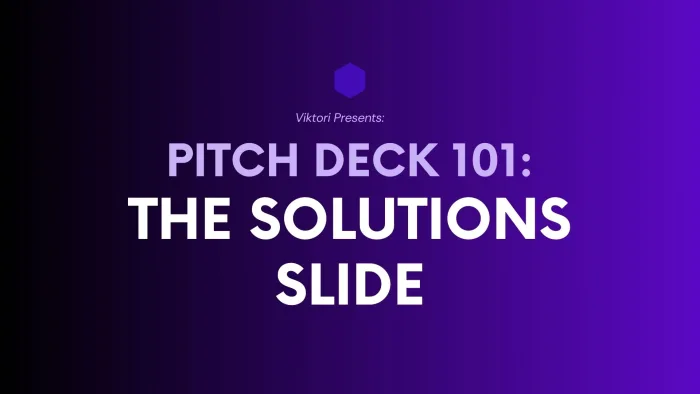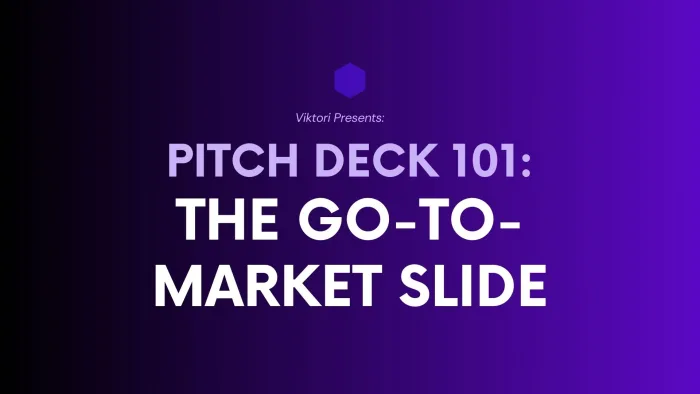So, you’ve got this killer supply chain management solution that’s going to change the game.
You’ve optimized, automated, and streamlined like a pro, but… when it’s time to pitch, investors give you that blank stare. The problem? It’s not them, it’s you (yeah, your pitch deck is the villain here, not your brilliant idea).
I’m Viktor, a pitch deck expert and creative business strategist. Over the past 13 years, I’ve helped businesses secure millions of $ in funding thanks to my approach and I’m sharing it here in this pitch deck guide.
But no worries, because we’re about to fix that. With this guide, you’ll build a supply chain management pitch deck that’s clear, compelling, and actually gets those checkbooks out. Ready to nail it? Let’s go.
Get My 12 Slide Framework That Got $500mil in Funding For Clients.
What do you think of having 12 dead simple formulas, that will help you craft 12 slides, in about 1 hour? That’s what you’ll get, when you download my 12 slide framework. Save hours crafting your pitch deck copy with my tested approach that includes:
- Elevator pitch one sentence formula
- Problem/ solution slide one sentence formula
- Competitor slide one sentence formula
- 9 other formulas, tips, tricks and advice
The formulas worked for 40+ industries and 500+ companies. Including the one you’re looking at now.
Clicking the link won’t charge you anything.
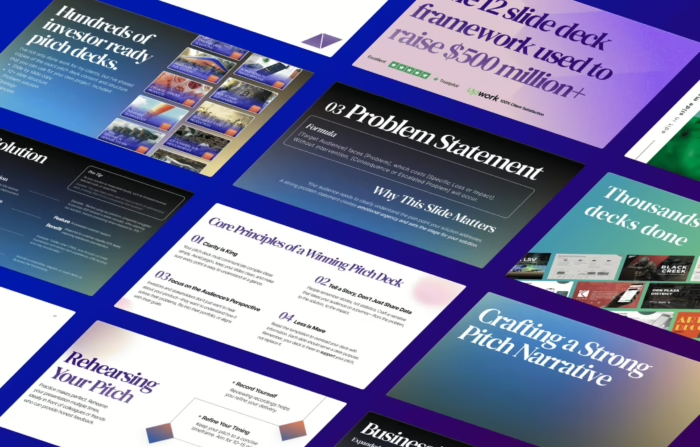
Get an investor ready pitch deck that gets you funded and saves over 30 hours of your time.
Join 100s of successful entrepreneurs who’ve transformed their pitch decks by using my hands-off approach, which includes: market research, copy, design, financials, narrative and strategy.
1 week turnaround time and less. Special pricing for early stage companies.
The least you will get on this call is 10 actionable tips & strategies to own that next pitch, worth $599, for free.
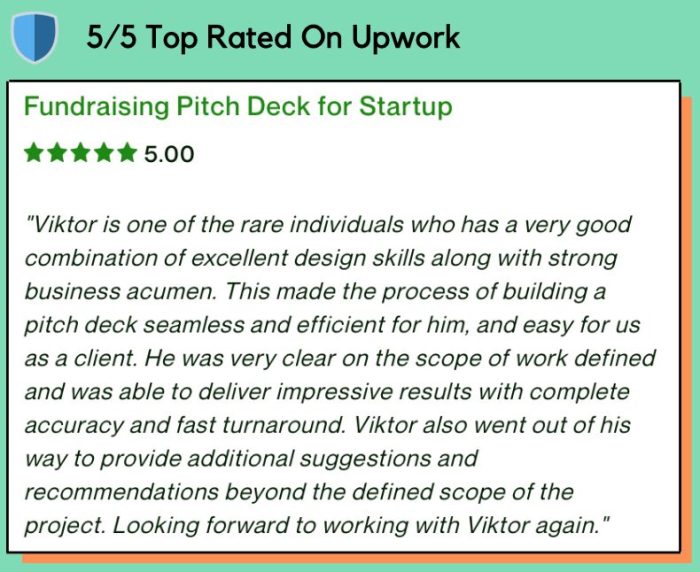
18 Slide Supply Chain Management Pitch Deck Template | Google Slides
The above is is just a simplified pitch deck version developed as part of our entrepreneurship program for graduate studies.
Founders that are serious about getting the funding they need, opt in for a deck has industry specific content, superb narrative and award winning design like these ones below:









I can help you build that deck with my hands-off process in 7 days or less.
Book a free 30 minute call below if you’re serious about getting an investor ready deck, and we’ll discuss your needs in detail. I’ll help you design the deck, write the content, develop the narrative and flesh out the strategy with financials.

We help 15,000+ founders every month create better pitch decks.
Alternatively, get the custom template for just $69,99.As soon as the payment is processed I’ll send over a quick questionnaire and deliver the deck in 24 hours and less.

Follow us on social for the newest templates:
1. Cover Slide
- Company Name: Your Company’s Name
- Logo: Place your company logo here
- Tagline: A concise, impactful tagline that summarizes your company’s mission or value proposition (e.g., “Revolutionizing Supply Chain Management”)
- Presenter’s Name and Contact Information: Include your name, job title, email address, and phone number
2. Introduction
- Brief Company Overview: Provide a short summary of your company, including when it was founded, its headquarters location, and the core problem it aims to solve.
- Example: “Founded in 2020 and headquartered in San Francisco, TrackFlow is dedicated to providing real-time supply chain visibility through advanced IoT and AI technologies.”
- Mission Statement: State your company’s mission in a clear and compelling way.
- Example: “Our mission is to enhance supply chain efficiency and transparency, enabling businesses to operate more effectively and sustainably.”
3. Problem Statement
- Description of Key Supply Chain Challenges:
- Visibility: Lack of real-time data and insights into supply chain operations.
- Efficiency: Inefficient processes leading to delays and increased operational costs.
- Risk Management: Difficulty in anticipating and mitigating risks such as supply chain disruptions.
- Statistics or Case Studies: Provide compelling data or examples to illustrate the impact of these challenges.
- Example: “According to a recent study, 60% of companies report significant inefficiencies due to lack of real-time supply chain visibility, resulting in an average 10% increase in operational costs.”
4. Solution
- Detailed Description of Your Supply Chain Management Solution:
- Product Overview: Briefly describe your product or service.
- Example: “TrackFlow offers a comprehensive platform that provides end-to-end visibility and predictive analytics for supply chains.”
- Key Features and Benefits:
- Real-Time Tracking: “Monitor shipments in real-time with our advanced IoT sensors.”
- Predictive Analytics: “Anticipate potential disruptions with AI-driven predictive analytics.”
- User-Friendly Dashboard: “Access all your supply chain data through an intuitive, customizable dashboard.”
- Unique Selling Proposition (USP): Highlight what makes your solution unique and superior to competitors.
- Example: “Unlike other solutions, TrackFlow combines real-time IoT data with powerful AI analytics, offering unmatched accuracy and predictive capabilities.”
- Product Overview: Briefly describe your product or service.
By clearly outlining the problem your company addresses, and presenting a compelling, well-defined solution, these slides set the stage for a persuasive pitch deck.
5. Market Opportunity
- Market Size and Growth Potential:
- Current Market Size: Provide statistics on the current market size for supply chain management solutions.
- Example: “The global supply chain management market was valued at $15 billion in 2021.”
- Growth Potential: Highlight expected growth rates and future market size.
- Example: “Expected to grow at a CAGR of 11%, the market is projected to reach $37 billion by 2027.”
- Current Market Size: Provide statistics on the current market size for supply chain management solutions.
- Target Audience and Market Segments:
- Primary Target Audience: Define who your main customers are.
- Example: “Our primary customers are mid-to-large-sized manufacturing and retail companies.”
- Secondary Market Segments: Identify additional market segments that could benefit from your solution.
- Example: “Secondary segments include logistics providers, distributors, and e-commerce companies.”
- Primary Target Audience: Define who your main customers are.
- Relevant Market Trends:
- Digital Transformation: Emphasize the shift towards digital supply chain solutions.
- Sustainability: Highlight the growing importance of sustainable supply chain practices.
- Risk Management: Discuss the increasing focus on risk mitigation and resilience in supply chains.
6. Business Model
- Revenue Streams:
- Subscription Fees: Describe your subscription model and pricing tiers.
- Example: “We offer tiered subscription plans based on the number of assets tracked, starting at $500 per month for small businesses.”
- Data Analytics Services: Detail additional revenue from advanced analytics and reporting services.
- Example: “Premium analytics packages available for an additional fee, providing deeper insights and custom reporting.”
- Subscription Fees: Describe your subscription model and pricing tiers.
- Pricing Strategy:
- Competitive Pricing: Explain how your pricing compares to competitors.
- Example: “Our pricing is competitive with industry leaders, offering more features at a lower cost.”
- Value-Based Pricing: Discuss how your pricing reflects the value provided to customers.
- Example: “We price our services based on the tangible savings and efficiency gains delivered to our clients.”
- Competitive Pricing: Explain how your pricing compares to competitors.
- Sales Approach:
- Direct Sales: Outline your direct sales strategy, including sales team structure and processes.
- Channel Partners: Describe partnerships with resellers and distributors to expand market reach.
7. Technology Integration
- Technologies Used:
- IoT (Internet of Things): Detail how IoT devices are used for real-time data collection.
- Example: “Our IoT sensors monitor temperature, location, and other critical parameters in real-time.”
- AI (Artificial Intelligence): Explain how AI algorithms enhance analytics and decision-making.
- Example: “AI-driven predictive analytics help identify potential disruptions and optimize routes.”
- Blockchain: If applicable, discuss how blockchain ensures data integrity and security.
- Example: “Blockchain technology secures transaction data, ensuring transparency and trust.”
- IoT (Internet of Things): Detail how IoT devices are used for real-time data collection.
- Benefits of These Technologies:
- Increased Efficiency: “IoT and AI technologies streamline operations, reducing delays and costs.”
- Improved Accuracy: “Real-time data collection and advanced analytics enhance the accuracy of supply chain insights.”
- Enhanced Security: “Blockchain provides an additional layer of security, protecting sensitive data.”
- Innovation Roadmap:
- Short-Term Plans: Outline immediate technological improvements and updates.
- Example: “In the next year, we will integrate advanced machine learning models to further enhance predictive capabilities.”
- Long-Term Vision: Describe long-term technological goals and innovations.
- Example: “Our long-term vision includes developing a fully autonomous supply chain management system using AI and robotics.”
- Short-Term Plans: Outline immediate technological improvements and updates.
8. Traction
- Current Customers and Partnerships:
- Major Clients: Highlight key customers who are using your solution.
- Example: “Currently serving over 100 clients, including Fortune 500 companies such as ABC Corp and XYZ Inc.”
- Strategic Partnerships: Discuss important partnerships that enhance your offering.
- Example: “Partnered with leading logistics providers and technology firms to enhance our solution’s capabilities.”
- Major Clients: Highlight key customers who are using your solution.
- Key Milestones Achieved:
- Product Development: “Successfully launched our MVP in Q1 2021, with continuous feature updates since.”
- Customer Growth: “Achieved a 200% increase in customer base within the first year.”
- Revenue Growth: “Generated $2 million in annual recurring revenue (ARR) within 18 months of launch.”
- Metrics Demonstrating Growth:
- User Engagement: “Average customer engagement increased by 30% quarter-over-quarter.”
- Retention Rates: “Maintaining a customer retention rate of 95%, indicating high satisfaction and value.”
- Market Penetration: “Expanded market presence in North America and Europe, with plans for Asia-Pacific next year.”
By fleshing out these slides, you provide a comprehensive overview of your market opportunity, business model, technological integration, and traction, making your pitch deck more compelling and informative for investors.
9. Go-to-Market Strategy
- Marketing and Sales Plans:
- Digital Marketing: Leverage digital channels such as social media, search engine marketing (SEM), and content marketing to reach potential customers.
- Example: “Running targeted LinkedIn campaigns to reach supply chain managers and decision-makers.”
- Industry Events: Participate in industry conferences, trade shows, and webinars to showcase your solution.
- Example: “Presenting at major supply chain events like CSCMP and LogiMAT to generate leads and build brand awareness.”
- Public Relations: Use PR strategies to gain media coverage and build credibility.
- Example: “Secured features in supply chain publications like Supply Chain Management Review and Logistics Management.”
- Digital Marketing: Leverage digital channels such as social media, search engine marketing (SEM), and content marketing to reach potential customers.
- Sales Strategy:
- Direct Sales Team: Employ a dedicated sales team to target large enterprises and manage key accounts.
- Example: “Our sales team is focused on Fortune 500 companies in the manufacturing and retail sectors.”
- Channel Partners: Collaborate with resellers and distributors to expand market reach and improve scalability.
- Example: “Partnering with technology integrators and logistics providers to offer our solution as part of a broader package.”
- Referral Program: Implement a referral program to incentivize current customers to refer new clients.
- Example: “Offering discounts and benefits to customers who refer new clients, driving word-of-mouth growth.”
- Direct Sales Team: Employ a dedicated sales team to target large enterprises and manage key accounts.
Hold on. You might want to check my list on the best presentation and communication books...
These are crucial books that will help you improve the design and structure of your decks and presentations, besides improving your delivery and skyrocketing your confidence when facing investors. Check them out below.
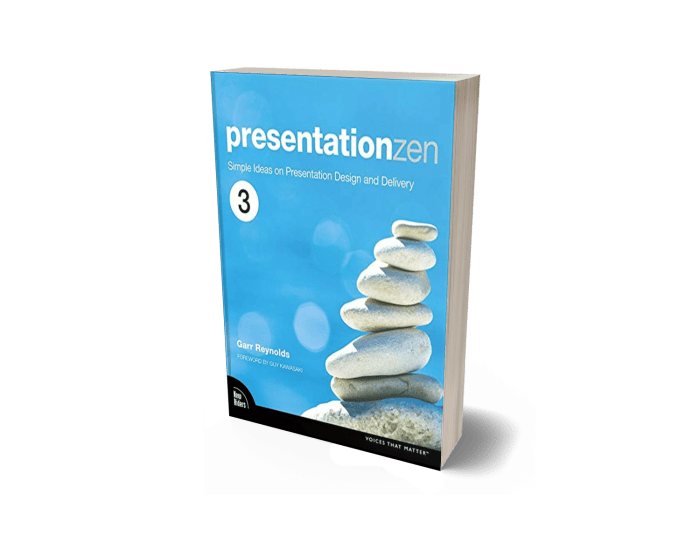
10. Financial Projections
- Revenue Forecasts:
- Year 1: Projected revenue of $5 million based on current customer acquisition and market expansion efforts.
- Year 2: Expected to reach $15 million with the addition of new features and expanded market reach.
- Year 3: Anticipated revenue of $30 million, driven by further scalability and international expansion.
- Expense Projections:
- Operational Costs: Breakdown of operational costs, including salaries, office expenses, and technology infrastructure.
- Example: “Projected annual operational costs of $2 million, with significant investments in technology and talent.”
- Marketing and Sales: Budget allocation for marketing campaigns, sales team expansion, and customer acquisition efforts.
- Example: “Annual marketing and sales budget of $1.5 million to drive growth and brand awareness.”
- R&D Investments: Planned investments in research and development to enhance product features and capabilities.
- Example: “Allocating $1 million annually for R&D to stay ahead of technological advancements.”
- Operational Costs: Breakdown of operational costs, including salaries, office expenses, and technology infrastructure.
- Break-even Analysis:
- Break-even Point: Projected to achieve break-even by the end of Year 2, with sustainable revenue streams and controlled expenses.
- Example: “Break-even expected at $10 million in revenue, driven by steady customer growth and cost management.”
- Break-even Point: Projected to achieve break-even by the end of Year 2, with sustainable revenue streams and controlled expenses.
- Key Assumptions:
- Market Growth Rates: Based on industry reports and market analysis, assuming a 10% annual growth rate in the target market.
- Customer Acquisition Costs: Estimated costs for acquiring new customers through various channels.
- Retention Rates: Assumed customer retention rate of 90%, based on current engagement and satisfaction metrics.
11. Team Expertise
- Key Team Members:
- CEO: Jane Doe – 20 years of experience in supply chain management and logistics, former VP at a leading logistics firm.
- Example: “Jane has led multiple successful supply chain projects and brings a wealth of industry knowledge to the team.”
- CTO: John Smith – 15 years of experience in IoT and AI technologies, previously CTO at a tech startup.
- Example: “John has developed innovative IoT solutions that have been implemented in large-scale supply chain operations.”
- COO: Sarah Lee – 10 years of experience in operations management, former Director of Operations at a major retailer.
- Example: “Sarah’s expertise in optimizing operations and improving efficiency is instrumental in our company’s success.”
- CEO: Jane Doe – 20 years of experience in supply chain management and logistics, former VP at a leading logistics firm.
- Advisory Board Members:
- Dr. Emily White: Supply chain professor with 25 years of industry experience and numerous publications.
- Example: “Dr. White provides strategic guidance and insights into industry trends and best practices.”
- Michael Brown: Former CEO of a logistics company with a successful track record in scaling businesses.
- Example: “Michael offers valuable advice on business strategy and growth opportunities.”
- Dr. Emily White: Supply chain professor with 25 years of industry experience and numerous publications.
- Relevant Experience and Backgrounds:
- Highlight the specific experiences and achievements of each team member that are relevant to the company’s goals.
- Example: “Our team has collectively managed over $1 billion in supply chain operations, delivering significant cost savings and efficiency improvements.”
- Highlight the specific experiences and achievements of each team member that are relevant to the company’s goals.
- Team’s Contributions:
- Describe how each team member contributes to the company’s mission and vision.
- Example: “Jane drives our strategic vision, John leads our technology development, and Sarah ensures operational excellence.”
- Describe how each team member contributes to the company’s mission and vision.
12. Regulatory Compliance
- Overview of Compliance with Relevant Regulations and Standards:
- Global Trade Regulations: Compliance with international trade laws and regulations to ensure smooth cross-border operations.
- Example: “Our platform adheres to all relevant import/export regulations, minimizing legal risks and operational delays.”
- Data Security and Privacy: Ensuring data protection and privacy through compliance with GDPR, CCPA, and other data protection laws.
- Example: “We have implemented robust data security measures, including encryption and regular audits, to comply with GDPR and CCPA.”
- Industry Standards: Adherence to industry-specific standards such as ISO 9001 for quality management and ISO 27001 for information security.
- Example: “Our company is ISO 9001 and ISO 27001 certified, demonstrating our commitment to quality and security.”
- Global Trade Regulations: Compliance with international trade laws and regulations to ensure smooth cross-border operations.
- Certifications and Industry Standards Adhered to:
- ISO Certifications: Highlight relevant ISO certifications and their importance.
- Example: “ISO 9001 certification ensures our processes meet the highest quality standards, while ISO 27001 guarantees information security.”
- Environmental Compliance: Compliance with environmental regulations and sustainability standards.
- Example: “We adhere to environmental regulations such as the EU’s REACH and RoHS, ensuring our operations are environmentally responsible.”
- ISO Certifications: Highlight relevant ISO certifications and their importance.
- Compliance Strategy:
- Internal Audits: Regular internal audits to ensure ongoing compliance with all relevant regulations and standards.
- Example: “We conduct quarterly internal audits to review and improve our compliance practices.”
- Training Programs: Comprehensive training programs for employees on regulatory compliance and best practices.
- Example: “Our team undergoes regular training on data privacy, security protocols, and industry-specific regulations.”
- Third-Party Audits: Engage third-party auditors to review compliance and provide unbiased assessments.
- Example: “We partner with third-party auditors for annual compliance reviews, ensuring we meet all regulatory requirements.”
- Internal Audits: Regular internal audits to ensure ongoing compliance with all relevant regulations and standards.
By detailing these slides, you provide a comprehensive view of your go-to-market strategy, financial projections, team expertise, and regulatory compliance, making your pitch deck robust and investor-ready.
13. Sustainability and Ethics
- Sustainable Practices and Initiatives:
- Carbon Footprint Reduction: Implementing strategies to reduce emissions throughout the supply chain.
- Example: “We optimize routes and use electric vehicles to cut down carbon emissions by up to 30%.”
- Resource Efficiency: Promoting efficient use of resources and reducing waste.
- Example: “Our AI-driven inventory management system minimizes overstock and waste, enhancing resource efficiency.”
- Carbon Footprint Reduction: Implementing strategies to reduce emissions throughout the supply chain.
- Ethical Sourcing and Fair Labor Practices:
- Ethical Sourcing Policies: Ensuring that all suppliers adhere to ethical standards.
- Example: “We source materials from suppliers who comply with fair labor practices and environmental standards.”
- Fair Labor Practices: Commitment to fair wages and safe working conditions for all workers in the supply chain.
- Example: “We conduct regular audits to ensure all partners adhere to fair labor practices, including no child labor and safe working environments.”
- Ethical Sourcing Policies: Ensuring that all suppliers adhere to ethical standards.
- Impact Metrics (e.g., carbon footprint reduction):
- Environmental Impact: Metrics demonstrating the positive environmental impact of your solution.
- Example: “Our clients have collectively reduced their carbon footprint by 15% using our optimized logistics solutions.”
- Social Impact: Metrics related to social initiatives and fair labor practices.
- Example: “100% of our suppliers are verified for fair labor practices, ensuring ethical treatment of workers.”
- Environmental Impact: Metrics demonstrating the positive environmental impact of your solution.
14. Risk Management
- Potential Risks and Mitigation Strategies:
- Supply Chain Disruptions: Identifying risks like natural disasters, geopolitical issues, and pandemics.
- Example: “Our platform provides real-time monitoring and alerts for potential disruptions, allowing for proactive risk management.”
- Supplier Reliability: Ensuring the reliability and stability of suppliers.
- Example: “We diversify our supplier base and conduct regular performance reviews to mitigate risks associated with supplier dependency.”
- Cybersecurity Threats: Protecting against data breaches and cyber-attacks.
- Example: “We employ advanced cybersecurity measures, including encryption, firewalls, and regular security audits, to protect sensitive data.”
- Supply Chain Disruptions: Identifying risks like natural disasters, geopolitical issues, and pandemics.
- Resilience Planning for Supply Chain Disruptions:
- Contingency Plans: Developing comprehensive contingency plans for various disruption scenarios.
- Example: “We have established contingency plans for different disruption scenarios, ensuring business continuity even during crises.”
- Inventory Buffers: Maintaining strategic inventory buffers to manage supply chain shocks.
- Example: “Our clients maintain optimal inventory buffers, reducing the impact of sudden supply chain disruptions.”
- Contingency Plans: Developing comprehensive contingency plans for various disruption scenarios.
- Cybersecurity Measures:
- Data Protection: Implementing robust data protection protocols.
- Example: “We use end-to-end encryption and conduct regular security audits to safeguard our clients’ data.”
- Employee Training: Training employees on cybersecurity best practices.
- Example: “All employees undergo cybersecurity training, ensuring they are aware of the latest threats and protection methods.”
- Data Protection: Implementing robust data protection protocols.
15. Customer and Market Validation
- Testimonials and Case Studies from Existing Customers:
- Customer Testimonials: Include quotes from satisfied customers.
- Example: “TrackFlow has revolutionized our supply chain operations, reducing costs and improving efficiency.” – John Doe, CEO of ABC Corp.
- Detailed Case Studies: Present in-depth case studies highlighting the success of your solution.
- Example: “In a case study with XYZ Inc., we reduced logistics costs by 20% and improved delivery times by 15%. Detailed metrics and analysis are included in the case study.”
- Customer Testimonials: Include quotes from satisfied customers.
- Pilot Programs and Beta Test Results:
- Pilot Program Success: Share results from pilot programs with key clients.
- Example: “Our pilot program with DEF Ltd. demonstrated a 25% increase in supply chain visibility and a 30% reduction in operational disruptions.”
- Beta Testing Feedback: Provide feedback and results from beta testers.
- Example: “Beta testers reported a 95% satisfaction rate, highlighting significant improvements in supply chain management and operational efficiency.”
- Pilot Program Success: Share results from pilot programs with key clients.
- Market Research Data Supporting Demand:
- Market Surveys: Present findings from market surveys indicating demand for your solution.
- Example: “According to a recent survey, 70% of supply chain managers identified real-time visibility as a critical need, aligning with our solution’s core offering.”
- Industry Reports: Cite industry reports that validate the market need.
- Example: “Gartner’s report on supply chain technology trends predicts a 15% annual growth in the adoption of real-time supply chain visibility solutions.”
- Market Surveys: Present findings from market surveys indicating demand for your solution.
16. Future Outlook
- Long-term Vision and Strategic Goals:
- Vision Statement: Articulate your long-term vision for the company.
- Example: “Our vision is to be the leading provider of innovative supply chain management solutions, driving efficiency and sustainability across global supply chains.”
- Strategic Goals: Outline specific long-term goals.
- Example: “Our strategic goals include expanding our market presence in Asia-Pacific, developing new AI-driven features, and achieving a customer base of 1,000 clients by 2025.”
- Vision Statement: Articulate your long-term vision for the company.
- Market Expansion Plans:
- Geographic Expansion: Plans to enter new markets.
- Example: “We plan to expand into Europe and Asia-Pacific over the next two years, targeting key markets with high demand for supply chain optimization.”
- Product Line Expansion: Developing new products or services.
- Example: “We aim to introduce new modules for inventory management and demand forecasting, enhancing our comprehensive supply chain solution.”
- Geographic Expansion: Plans to enter new markets.
- Technological Advancements and Innovation Plans:
- AI and Machine Learning: Future developments in AI and machine learning.
- Example: “We are investing in advanced AI and machine learning algorithms to enhance predictive analytics and automate more aspects of supply chain management.”
- Blockchain Integration: Incorporating blockchain for enhanced security and transparency.
- Example: “Our roadmap includes integrating blockchain technology to ensure data integrity and enhance traceability across the supply chain.”
- AI and Machine Learning: Future developments in AI and machine learning.
These slides provide a comprehensive view of your company’s commitment to sustainability and ethics, robust risk management strategies, customer and market validation, and a clear vision for future growth. This thorough approach will help build investor confidence and demonstrate the potential for long-term success.
17. Funding Ask
- Amount of Funding Required:
- Funding Request: Clearly state the total amount of funding you are seeking.
- Example: “We are seeking $10 million in funding to scale our operations and accelerate growth.”
- Funding Request: Clearly state the total amount of funding you are seeking.
- Detailed Use of Funds:
- Product Development: Allocation of funds towards enhancing and expanding product features.
- Example: “35% of the funds will be used for product development, including the integration of advanced AI and blockchain technologies.”
- Marketing and Sales: Budget for marketing campaigns, sales team expansion, and customer acquisition efforts.
- Example: “30% will be allocated to marketing and sales to drive market penetration and customer acquisition in new regions.”
- Operations and Infrastructure: Investment in operational infrastructure to support scaling.
- Example: “20% will be dedicated to operations and infrastructure, including new office spaces and technology infrastructure.”
- Talent Acquisition: Hiring key personnel to strengthen the team.
- Example: “15% will be used for talent acquisition, focusing on hiring experts in AI, logistics, and business development.”
- Product Development: Allocation of funds towards enhancing and expanding product features.
- Expected Outcomes and Milestones Achieved with the Investment:
- Revenue Growth: Projected revenue growth with the investment.
- Example: “With this investment, we expect to triple our revenue within two years, reaching $30 million in annual revenue.”
- Customer Base Expansion: Increase in customer acquisition and retention.
- Example: “We aim to expand our customer base to 500 clients by the end of the second year, maintaining a 90% retention rate.”
- Product Enhancements: New features and improvements launched.
- Example: “Launch of new AI-driven predictive analytics features and blockchain integration within the next 18 months.”
- Revenue Growth: Projected revenue growth with the investment.
18. Closing Slide
- Thank You Message:
- Express Gratitude: Thank the audience for their time and consideration.
- Example: “Thank you for your time and interest in TrackFlow. We are excited about the opportunity to revolutionize supply chain management with your support.”
- Express Gratitude: Thank the audience for their time and consideration.
- Contact Information:
- Primary Contact: Provide the primary contact person’s name, title, email, and phone number.
- Example: “For further discussions, please contact: Jane Doe, CEO Email: jane.doe@trackflow.com Phone: (123) 456-7890″
- Company Website: Include your company’s website URL.
- Example: “Visit our website at www.trackflow.com for more information.”
- Primary Contact: Provide the primary contact person’s name, title, email, and phone number.
- Call to Action:
- Next Steps: Encourage investors to reach out for more detailed discussions or to schedule a follow-up meeting.
- Example: “We look forward to discussing how we can work together to achieve groundbreaking advancements in supply chain management. Please reach out to schedule a follow-up meeting or to request further information.”
- Next Steps: Encourage investors to reach out for more detailed discussions or to schedule a follow-up meeting.
These final slides are critical in making a strong, lasting impression. Clearly stating your funding needs and how the funds will be utilized, followed by a gracious thank you and an easy way for investors to get in touch, wraps up your pitch deck professionally and effectively.
Last Words
Alright, that’s the secret sauce to crafting a pitch deck that’ll actually get investors to stop scrolling through Instagram during your presentation. A well-structured, brand-aligned deck is your secret weapon to grabbing attention and securing funding.
And hey, if you’re still feeling stuck, no sweat. Reach out, and we’ll whip up a custom template that’s gotten others the funding, partnerships, and deals they’ve been chasing. Now go out there, drop that killer pitch, and watch the investments roll in.
You got this.
But if you don’t got it:
Join hundreds of successful entrepreneurs who’ve transformed their pitch decks with my help.
Let me develop an investor ready deck by using my hands-off approach, which includes: market research, copy, design, financials, narrative and strategy.
One week turnaround time.
The least you will get is 10 actionable tips & strategies to own that next presentation, worth $599, for free.

Related Manufacturing Pitch Deck Templates
From Trash to Treasure: A 12 Slide Bio-Packaging Pitch Deck Template That Turns Ideas into Investment | Google Slides
Picture this: you’re staring at a shelf stocked with endless rows of identical, glossy packages,…
11 Slide Manufacturing Automation Pitch Deck Template | Google Slides
So, you’ve decided to bring your manufacturing processes into the 21st century. Good call—because, spoiler…
From Machine Meltdowns to Investor Buy-Ins: Your 12 Slide AI Manufacturing Solutions Pitch Deck Template Awaits | Google Slides
Let’s be real: factories aren’t exactly the settings of futuristic sci-fi novels—yet. Machines break down,…
11 Slide AI Vision in Manufacturing Pitch Deck: Think of It as the ROI Generator Investors Dream About | Google Slides
Picture this: You’re running a manufacturing plant that could give Tony Stark’s lab a run…
15 Slide Sustainable Metal Recycling Solutions Pitch Deck Template That’ll Have Investors Scrapping to Invest | Google Slides
Alright, let’s be real. The world is drowning in metal waste—rusting piles in landfills, scrap…
Put Your Chips on This: A 11 Slide Semiconductor Innovation Pitch Deck Template That Turns Tech-Speak into Investor Gold | Google Slides
You’re working on a semiconductor that could finally stop your laptop from feeling like a…
12 Slide Pitch Perfect IC Design: Nail the Funding, Skip the Debugging with This Investor-Proof Deck | Google Slides
You’ve developed a cutting-edge IC design platform, but here’s the catch: No one’s jumping on…
9 Slide Furniture Big Commerce Pitch Deck Template: Because Your Sales Shouldn’t Be as Wobbly as Your Old Chair
So, you’ve got a solid furniture manufacturing business. Maybe you’ve been around for decades, maybe…
14 Slide Industrial Liquid Pitch Deck Template: Because Even Your Liquids Need a Better Pitch!
Ever walked into a factory and thought, “Wow, this place runs like a Swiss watch”?…
The 12 Slide Motorcycle Oil Pitch Deck Template That Keeps Your Funding Running Smoother Than a Well-Oiled Machine | Google Slides
So, you’re ready to conquer the motorcycle oil market, but something’s holding you back. Maybe…
Bricks, Clicks, and Cash: The 14 Slide Pitch Deck Template That’s Ready to Build Your Empire | Google Slides
Let’s lay the foundation for something impactful. You’re here because you have a vision for…
18 Slide Supply Chain Management Pitch Deck Template: Stop Delays, Start Delivering Investor Cash | Google Slides
So, you’ve got this killer supply chain management solution that’s going to change the game….
16 Slide Manufacturing Pitch Deck Template: Because ‘Just Trust Us’ Doesn’t Work Anymore
So, you’ve got this groundbreaking manufacturing idea, and you’re ready to revolutionize the world—one widget…
Trigger Investor Interest: Fire Off a Winning Pitch with Our 12 Slide Arms Manufacturer Template | Google Slides
So, you’ve cooked up a business idea that’s supposed to revolutionize the arms industry—think it’s…
16 Slide Auto Manufacturers Pitch Deck Template: Turbocharge Your Funding Journey | Google Slides
So, you’ve got the blueprint for the next Tesla-killer—or maybe you’re dreaming up a fleet…
15 Slide Investment Property Pitch Deck Template: Impress Investors Without the Boring Real Estate Jargon | Google Slides
Alright, let’s be real. You’ve got your eye on the world of investment properties, thinking,…
Looking for a step by step guide to build a manufacturing pitch deck?
Check out our in-depth manufacturing pitch deck guide.
Check out some of the essential 101 guides:
Mastering the Financial Projections Slide: Turning First Impressions into Lasting Opportunities
You’re convinced your startup is the next big thing, but somehow, your pitch keeps landing…
Creating an Impactful Traction Slide for Your Investor Pitch Deck: A Startup Guide
You’ve got the next unicorn startup brewing, but here’s the harsh reality: your traction slide…
Mastering the Pitch Deck Solution Slide: A Startup’s Guide to Success with Slide Perfection
You’ve got the next big thing, whether it’s a revolutionary SaaS platform or the future…
Mastering Your Pitch Deck Go-to-Market Slide: A Step-by-Step Guide For Startups
Ever pitched your groundbreaking idea, only to be met with blank stares and polite nods?…
Pitch Deck Problem Slide: Template, Examples, Guide
You’ve got a groundbreaking business idea, but somehow, the investors aren’t biting. Here’s the kicker:…
The Elevator Pitch Slide | Examples, Template, Tips & Guide
Imagine having a revolutionary idea that could disrupt an entire industry. You’ve done the hard…





